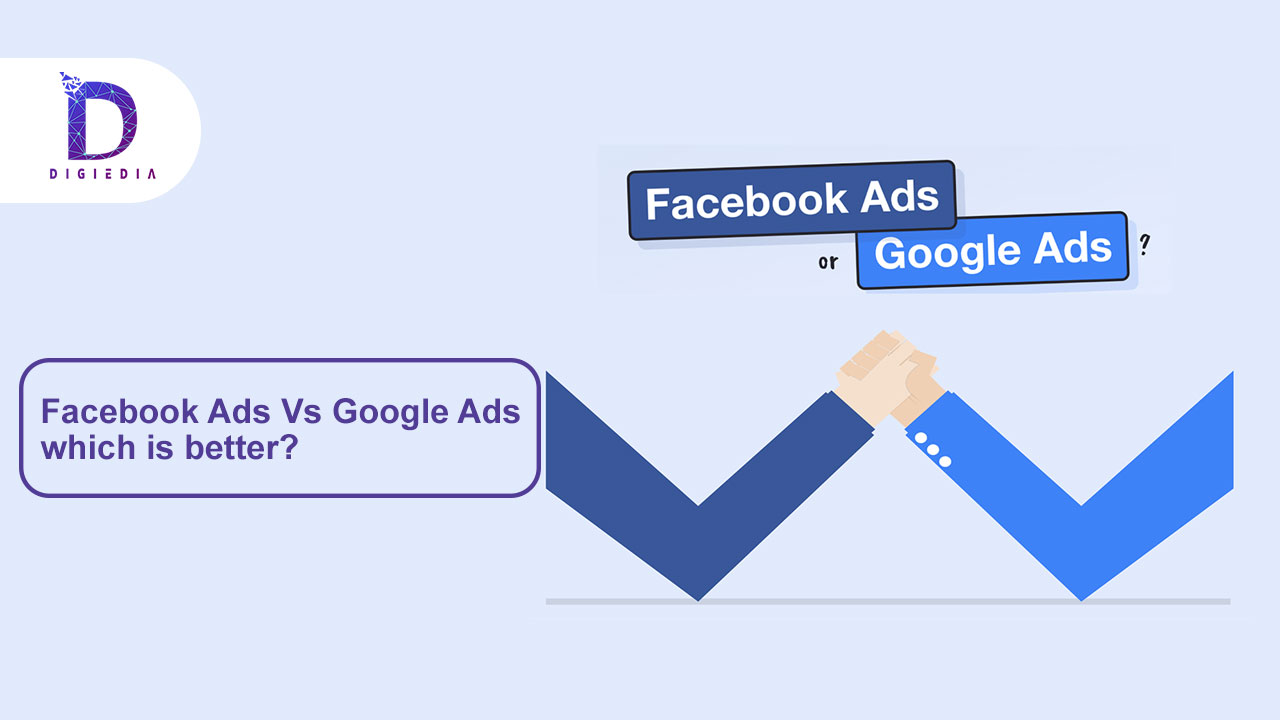
FACEBOOK ADS VS GOOGLE ADS WHICH IS BETTER
- DIGIEDIA
- Blogs, SEO (Search Engine Optimisation), Social Media Marketing
- 10 January 2022
- No Comments
To begin, what are the differences between Google Ads and Facebook Ads? You’ve most likely seen them previously on Facebook or Google! But, in practice, how do they work? These are both pay-per-click (PPC) advertising platforms. When you create an ad on either platform, you enter an auction in which you bid on how much you want to spend on ad space. You’ll be charged a certain amount of money each time someone clicks on one of your ads (more on that later). Isn’t it easy? Drawing conclusions between Facebook Ads Vs Google Ads is not easy as ways in which the two platforms have evolved independently of one another illustrates that Google and Facebook should be used in tandem, not in competition.
FACEBOOK ADS VS GOOGLE ADS: WHAT’S THE DIFFERENCE?
Paid Search vs. Paid Social
Paid search is what Google Ads (AdWords) is known for. You pay to have your listing appear on a search engine result page, which is known as paid search (SERP). Instead of targeting a specific audience interest, paid search ads are placed based on target keywords. However, you can (and should) tweak the settings of your sponsored search campaign to target visitors based on their geography and other characteristics.
Google Ads, on the other hand, offers more than just paid search—you can advertise on:
- Google Search
- Youtube ads
- Google Display Network
- Google Shopping
- Google Maps
- Google Play
Facebook Ads, unlike paid search, allows you to pay for social media advertising. Businesses are finding it more difficult to reach out to potential customers organically as a result of Facebook’s algorithm changes. This is where the use of paid social media comes into play. Instead of reaching new clients organically, you can use Facebook Ads to pay to be in front of them on social media.
Facebook is more than just your Facebook newsfeed, as you may know. You can advertise on Facebook in a variety of places, including:
- Facebook News Feed
- Instagram Feed
- Facebook Marketplace
- Facebook Video Feeds
- Facebook Right Column
- Audience Network
- Facebook Messenger
FACEBOOK ADS VS GOOGLE ADS: POINTS OF COMPARISON
- Audience Size
Google and Facebook both have a large audience: Google is anticipated to handle more than 5.8 billion daily inquiries, while Facebook has 1.73 billion daily active users.
Mobile advertising revenue accounts for approximately 90% of the total advertising revenue on Facebook. Mobile advertising, on the other hand, isn’t something you should overlook! You can’t determine the greatest fit for your business based on audience size because your target demographic is almost definitely on both of these platforms.
Consider the following questions instead:
- Are these social media channels used by my target audience?
- Is my product geared for social media or search?
Even if Google receives 5.8 billion requests every day, if no one is looking for it, no one will find it.
- Buyer Intent
Google Ads almost always outperform Facebook Ads when it comes to buyer intent. Consider your type of business: do customers look for your product or service when they’re ready to buy?
When a person’s air conditioner fails, for example, they instantly begin looking for an HVAC repair company. Your firm would be in front of a potential customer at the exact moment they require your services, thanks to search adverts.
That person, on the other hand, is unlikely to recall the HVAC company they saw on Facebook three months ago. Google Ads would be the clear winner in this case.
In addition, Facebook advertising is less effective at persuading leads to convert immediately. People use Facebook to unwind and socialize rather than shop. This platform, however, is still extremely valuable for growing your following. People will be far more likely to buy when they need your service or product if you can develop a feeling of community on social media.
However, if your campaign’s goal is to raise brand awareness rather than fast conversions, Facebook may be the ideal option.
- Targeting
Both Google and Facebook Ads allow you to target (and retarget) specific audiences. On both sites, you may target users depending on their age, gender, location, and financial level. When it comes to complicated targeting options, though, Facebook takes the lead.
Facebook allows you to create audiences based on a wide range of interests and behaviors, in addition to the targeting options outlined above, thanks to the amount of data collected from their 2.6 billion monthly active users.
On Facebook, you can target a very particular audience. If your target audience is particularly targeted, Facebook Ads will be a great solution for you.
Lookalike Audiences is a Facebook feature that allows you to advertise to people who are similar to your current audience. Facebook matches your customers to similar individuals based on their existing data, which may be a highly strong choice for advertising.
- Ad Formats
What about the various ad formats? This brings us back to the original question: what is your campaign’s goal? Facebook has far more inventiveness, making it a far superior venue for increasing brand exposure and consumer loyalty.
If you use Google Ads, you have a short block of text on the SERPs to capture the attention of potential buyers. You can utilize ad extensions to add more text and content, but with search advertisements, your format will be limited to text.
Using image-based advertising on Facebook, however, you may give your message more visual impact. Facebook is also continuing to experiment with different ad types in order to combat “ad fatigue.” To grab your audience’s attention, you can utilize movies, graphics, carousel advertisements, and more. If you have an eCommerce store, the aesthetic aspect of Facebook should be a major factor in deciding which platform is best for you.
FACEBOOK ADS VS GOOGLE ADS: THE BOTTOM LINE
Google Ads and Facebook Ads are both extremely effective advertising platforms that can be used by almost any type of company. When assessing the capabilities and possible uses of each solution, it’s clear that the two platforms should be considered complementary rather than hostile.
Using the power of paid search and paid social in tandem is a highly effective marketing strategy. It does, however, necessitate a dual advertising strategy that is suited to each platform’s characteristics. Although the language used in Google and Facebook Ads is similar – and should be – it’s vital to understand how to get the most out of each platform in order to maximize ROI and build your brand.
